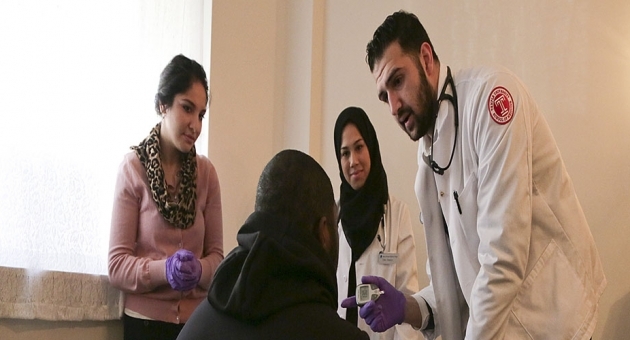
For Richard, who has been homeless for nearly a year, finding a place to sleep at night is often a challenge. Most of his days are spent trying to meet his basic needs, leaving little time to worry about health issues, such as the swelling in his ankle.
Members of Al-Shifaa, a Temple-based organization that mentors Muslim healthcare professionals and students, recently coordinated a health screening event to help people like Richard. Al-Shifaa set up a health pavilion in the United Muslim Islamic Center during a weekend food bank to provide health services to one of the most vulnerable segments of Philadelphia’s population: the homeless.
The event was a collaboration with Feed Philly and the Islamic Circle of North America.
As people came into the center for a hot meal, they were also offered free healthcare screenings conducted by Temple University School of Medicine students and faculty and Al-Shifaa members from other local colleges and universities.
“It’s important for those who spend a lot of time outside due to homelessness to seek assistance, especially in the winter months,” said Kamil Amer, a second-year Temple medical student and member of Al-Shifaa.
Medical students screened patients for infections, fever and diabetes; took their blood pressure; and checked their heart and lungs for abnormalities such as pneumonia. Students from Kornberg School of Dentistry also offered dental checkups, and podiatry students gave feet exams and checked for gait abnormalities.
The students, who screened more than 100 patients, will follow up with those who need treatment for medical issues identified during the screening.
“This was an amazing opportunity to help many people who do not have access to any type of healthcare,” said Amer, “and to work on a way of incorporating them into the healthcare system.”
Al-Shifaa, which means “the healing” in Arabic, offers events, talks and a range of community-service activities, including tutoring and healthcare clinics.
The event was also intended to counter negative stereotypes about the Muslim religion, said Taha Mur, a student at Temple School of Medicine and president of Al-Shifaa.
“The purpose of this event was twofold. It helped underprivileged patients and showed the community what Islam is really about: helping those in need through peaceful and enlightening actions,” said Mur. “We aim to show the community that there is a strong Muslim presence and that Islam is more than it is portrayed in the media. We will do this by first giving back to the community.”